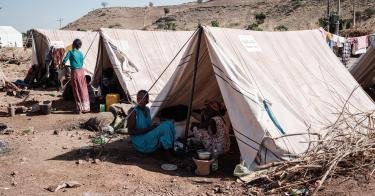Ethiopian Prime Minister Abiy Ahmed has pronounced as complete a three-week-long military operation against rebel forces in northern Tigray state. Federal forces captured the state capital of Mekelle, and it appears that Tigrayan forces are reeling, though information is patchy because of a government-imposed communications blackout.
Unilateral “mission accomplished” declarations have a checkered track record, however and the fighting in Ethiopia is now likely mutating into a long, grinding insurgency. The country and the region in which it sits can ill afford such a tragedy—and it’s one that might have been avoided.
The conflict began when fighters from the Tigray People’s Liberation Front (TPLF), which ruled with an iron fist for nearly 30 years until being displaced by Mr. Abiy in 2018, allegedly attacked an Ethiopian military base in November. Federal forces, buttressed by militias from neighboring Amhara state and indeterminate support from Eritrea, quickly attacked Tigray to dismantle the TPLF.
At that time, the heavily armed TPLF had as many as 250,000 fighters. However, it is caught in a multifront war and is bottled up by a hostile Eritrea to the north, the invasion from the south, and Sudan to its west that closed border posts. It appears that Mekelle fell with scant resistance, despite TPLF boasting of how costly taking the city would be. On Nov. 28, Mr. Abiy tweeted that the military operations had transitioned to a police action to arrest the TPLF leadership.
But the end of conventional fighting likely signals the beginning of unconventional fighting. Born as an insurgency in the mid-1970s, the TPLF understands this type of warfare, and some of its fighters are reportedly already scattering to the hills.
Their chances of sustaining a significant guerrilla war are good. Insurgencies are fundamentally a contest for the population’s support or at least acquiescence, and most Tigrayans are likely to favor the TPLF over the non-Tigrayan invading forces.
In Ethiopia’s superheated ethnic environment, Mr. Abiy’s use of militias from rival Amhara state, and allowing Amharas to administer conquered territory in western Tigray, must surely look to ordinary Tigrayans like vengeance taking.
The TPLF does lack the type of sanctuary that is often critical to successful insurgencies, but Tigray’s forbidding terrain can help. Resupply and funding will also be difficult given the TPLF’s isolation, though armed groups often adopt insurgency in part because it requires much less materiel than conventional fighting.
A sustained, low-intensity conflict in northern Ethiopia would be terrible for the region and the U.S.
Africa’s second most populous country, Ethiopia is a fast-growing economic power and a major American security partner that has fought the al-Shabab terrorist group in Somalia for years.
The Tigray fighting is sending refugees spilling into Sudan, itself in the midst of a hopeful but fraught political transition supported by the U.S. The conflict, and the ethnic divisions it is exacerbating, imperil Ethiopia’s chances of becoming the type of stable, democratic country that makes the strongest American partner.
This developing tragedy may have been unavoidable. Mr. Abiy inherited a state wounded by decades of misrule, including damage from the TPLF’s abusive reign. The intransigence of TPLF lost-causers has been a thorn in his side from the earliest moments of his rule.
But it is not obvious that Mr. Abiy exhausted every reasonable option for avoiding the catastrophe of a fratricidal war. His peremptory management of even admirable reforms—such as making peace with Eritrea and other initiatives—may have been well-intentioned, but it exacerbated Tigrayans’ fears of authoritarian overreach and did not promote de-escalation.
Others now share that fear. Tellingly, Mr. Abiy has lost support among his tribe, the Oromo, who led the revolution that elevated him and who were his first and most ardent backers.
The U.S. and other concerned countries have been right to call for an end to the fighting, but neither side appears willing to negotiate. That means the war in Ethiopia is likely just beginning.
This piece originally appeared in The Washington Times



